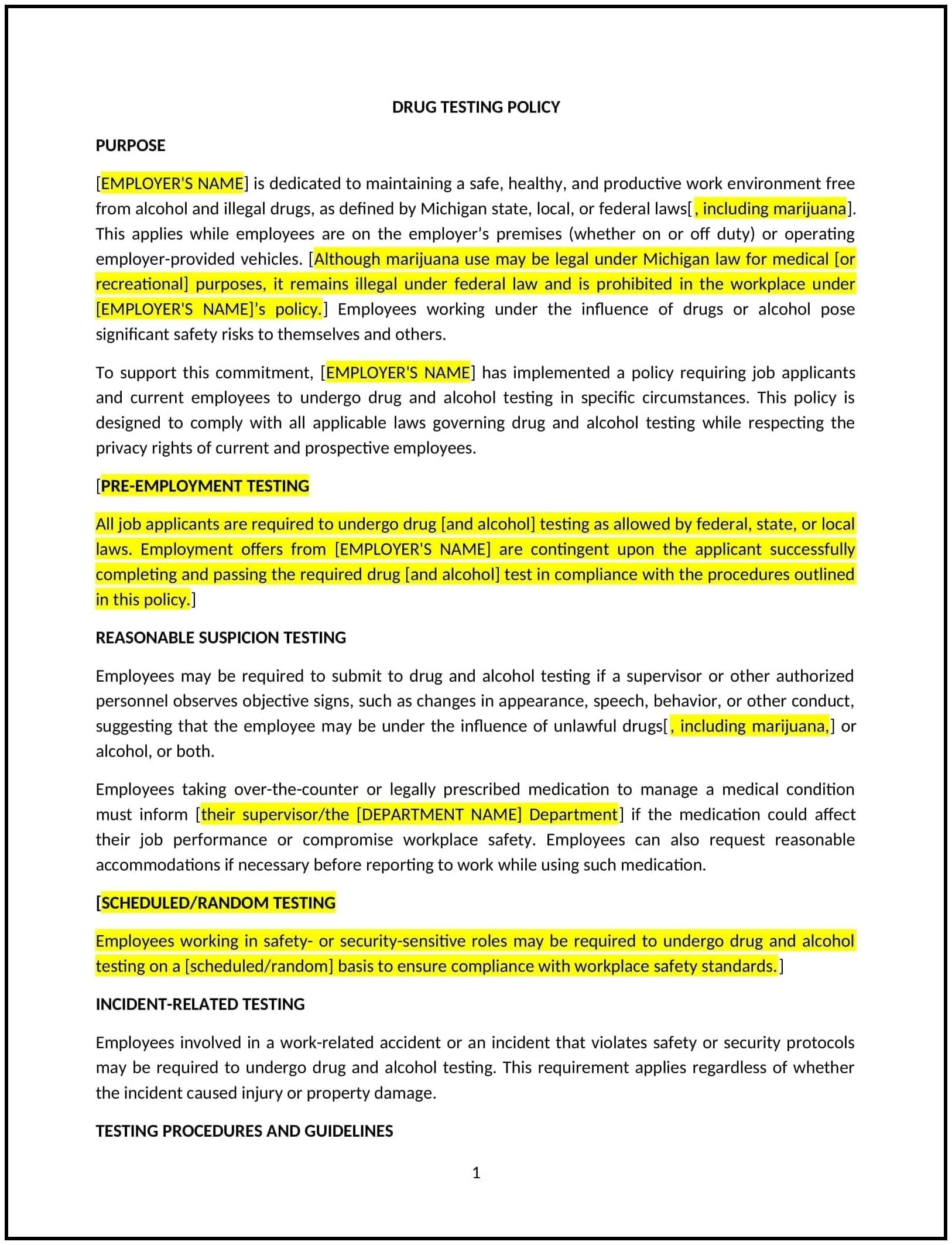Got contracts to review? While you're here for policies, let Cobrief make contract review effortless—start your free review now.

Customize this template for free
Drug testing policy (Michigan)
A drug testing policy provides Michigan businesses with guidelines for conducting drug tests on employees or job applicants to ensure a drug-free workplace. This policy outlines the circumstances under which drug testing may occur, the procedures for conducting tests, and the steps taken in the event of a positive result. The policy ensures that drug testing is performed fairly and legally, while balancing the needs of the business and the rights of employees.
By adopting this policy, businesses can promote a safe and productive work environment, reduce the risk of accidents or injuries, and ensure compliance with applicable state and federal regulations.
How to use this drug testing policy (Michigan)
- Define the scope of testing: Clearly specify when drug testing may be required, such as during pre-employment screening, after workplace accidents, as part of random testing, or based on reasonable suspicion of drug use.
- Identify substances to be tested for: List the specific drugs and substances that will be tested for, such as marijuana, alcohol, prescription drugs, or illegal substances, and outline any legal exceptions, such as medical marijuana use.
- Set testing procedures: Establish clear procedures for how drug testing will be conducted, including the method of testing (e.g., urine, saliva, hair follicle), who will administer the test, and how confidentiality will be maintained during the process.
- Provide consent requirements: Require employees or applicants to sign a consent form before testing is conducted, acknowledging that they understand the testing process and agree to participate.
- Specify consequences of positive results: Outline the steps to be taken in the event of a positive drug test result, which may include disciplinary action, suspension, rehabilitation programs, or termination of employment, depending on the severity and circumstances.
- Address accommodations: Include provisions for employees who may need accommodation due to prescription drug use or medical conditions, and ensure compliance with Michigan’s medical marijuana laws and the Americans with Disabilities Act (ADA).
- Review testing periodically: Regularly evaluate the drug testing policy to ensure that it is in compliance with changing laws, industry standards, and business needs.
Benefits of using this drug testing policy (Michigan)
This policy provides several key benefits for Michigan businesses:
- Promotes workplace safety: Drug testing helps reduce the risk of accidents, injuries, or impaired performance in safety-sensitive roles, ensuring a safer environment for all employees.
- Improves productivity: A drug-free workplace can lead to improved focus, performance, and overall employee productivity by minimizing the impact of substance abuse.
- Reduces legal liability: By following established procedures for drug testing, businesses can reduce the risk of legal liability or claims related to workplace accidents or drug-related incidents.
- Encourages employee well-being: The policy can help employees who are struggling with substance abuse by providing access to rehabilitation programs or support services, promoting a healthier workforce.
- Ensures legal compliance: The policy helps businesses comply with Michigan state laws, federal regulations, and industry standards regarding drug testing, including medical marijuana and employee privacy rights.
Tips for using this drug testing policy (Michigan)
- Communicate the policy: Ensure that all employees are aware of the drug testing policy by including it in the employee handbook, during onboarding, and through regular training and reminders.
- Keep the testing process confidential: Maintain confidentiality throughout the drug testing process, ensuring that test results are shared only with authorized personnel.
- Implement reasonable suspicion guidelines: Clearly define what constitutes reasonable suspicion for testing, such as observable behavior or evidence that an employee is under the influence of drugs during work hours.
- Offer support for employees with substance abuse issues: Consider offering support for employees with substance abuse issues, such as access to rehabilitation programs, counseling, or employee assistance programs (EAPs).
- Review periodically: Regularly review the drug testing policy to ensure it complies with Michigan state laws, federal regulations, and evolving industry standards.